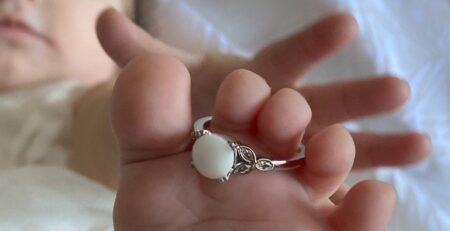Debunking the Top 4 Breastfeeding Myths & Misconceptions
As a new parent, you’re certain to encounter the phrase “breast is best.” While this is true for many parents, it isn’t a statement of objective fact. Still, many new moms feel frustrated when breastfeeding does not immediately work for their baby, body or lifestyle. Likewise, some moms-to-be convince themselves they aren’t candidates for breastfeeding before their sweet baby has arrived.
Are breastfeeding myths and misconceptions already impacting your earliest parenting decisions? Consider that many of the things you “know” about breastfeeding may not be true.
With that in mind, we’ve gathered the most common myths about breastfeeding. Whether through gossip or old wives’ tales, many modern moms believe these things are true. We’ll debunk these misconceptions with science-backed answers that offer peace of mind as you start your journey.
Continue reading to learn the truth behind these breastfeeding myths and facts.
Myth #1: There’s a Link Between Breast Size and Milk Supply
The human body is a remarkable thing. A healthy woman has everything she needs to both grow and sustain human life. That includes the biological systems necessary to feed your baby from your own body.
This is true regardless of the size of your breasts. Small-breasted and large-breasted women are equally capable of producing milk and feeding their children.
Something that many new moms don’t realize is that your breasts will change a great deal during pregnancy. In fact, an early color or shape change is often the first clue that a woman is pregnant.
According to New York Presbyterian nurse Mary Lou Mulholland, your breasts begin producing colostrum in the second trimester. That means changes are both internal and external. If you consume adequate nutrition during pregnancy, your body should have what it needs to produce milk.
If breast size makes breastfeeding confusing or uncomfortable, it’s best to reach out and ask for help. A nurse or lactation consultant is an excellent resource for new moms. They can help you achieve a comfortable position, whatever your bust size.
Likewise, there are solutions available for women with flat or inverted nipples. According to professionals from the Kaiser Permanente Health System, nipple shields are a fantastic tool. Wearing them beginning the month before your due date can help prepare and position nipples for breastfeeding.
Even women with breast augmentation or reduction surgery can often breastfeed. The takeaway is that no body is the “wrong” body for feeding a child.
Myth #2: You Should Not Breastfeed While Sick

The “antibodies breastfeeding myth” is a pervasive one. In essence, many women believe they should stop breastfeeding if they get sick. They worry that the germs or bacteria may travel through the breastmilk and affect their baby.
Experts at UNICEF say this is patently untrue. In fact, in most cases, breastfeeding can protect your baby for years to come. As you feed your child, they will take in antibodies from your breast milk. This will increase the strength of their immune system, helping them fight off future illnesses.
Additionally, many women worry that they cannot take any medication while breastfeeding. This is mostly untrue. In most cases, you can work with your doctor to determine a dosage schedule that works with your feeding schedule. Your doctor may also be able to prescribe a safer dosage or medication to take while breastfeeding.
Always read drug facts carefully and consult a physician with any questions. There is almost always a solution that will keep both you and your baby safe and healthy.
Myth #3: Breastfeeding Is Easy
Breastfeeding is a natural process, and we have bodies designed to accomplish it. As a result, many women believe they should be able to master the process immediately. However, that’s not the case. According to an NPR survey, 92% of new moms reported struggling three days after their child’s birth.
“Struggling” means different things for different mothers. Some have difficulty with milk production and supply, while others can’t seem to master the latch. Others experience pain and convince themselves they may be doing something wrong. As a result, many women give up, failing to meet the AAP’s recommendation of six months of exclusive breastfeeding.
All that to say, the secret is often asking for and accepting help. Nurses and lactation consultants are excellent resources who can offer tips and suggestions. You can also try community resources, such as La Leche League.
Remember that your baby is a brand new person. They don’t know how to do everything yet, and you don’t expect them to.
Likewise, you are a brand-new parent. Extend the same grace to yourself by permitting yourself the time and space to learn. If breastfeeding is important to you, don’t give up before reaching out for assistance.
Myth #4: If You Can’t Breastfeed, You’ve Failed
Many women are able to successfully breastfeed with coaching and support. The truth is that breastfeeding is simply not feasible for some mothers for a variety of reasons. Because of cultural messaging, it is easy to equate this experience with failure.
If your baby receives the nourishment they need to grow and thrive, you are not a failure. While breastmilk is ideal for human babies, formula is also a complete source of energy for a growing infant.
As science advances, infant formula is becoming safer and more nutritionally sound. While your little one may not get the same live antibodies, formula contains equivalent amounts of protein, fat, carbohydrates and water.
Ultimately, if you are feeding your baby, you are succeeding. Take pride in your efforts, and enjoy your beautiful baby.
The Top Breastfeeding Myths: Debunked
New parents have a lot on their plates. You deserve peace of mind as you navigate this complex and rewarding journey. Access to the most pressing, research-backed answers is critical to making confident parenting decisions. We hope the answers above will help you as you begin to make choices about how to feed your child.
If you do choose a beautiful breastfeeding journey, prepare to experience a challenging, intimate and incredibly rewarding bonding experience. You can commemorate your experience with stunning pieces from KeepsakeMom. Transform your milk into a high-quality, wearable keepsake that you can wear near your heart for a lifetime.
Shop the complete collection of Breastmilk Jewelry at KeepsakeMom.






